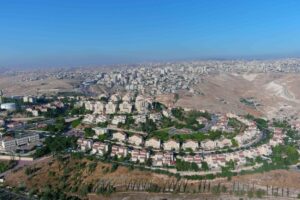
The National Interest Foundation Newsletter
Issue 135, February 24, 2022
Welcome to our NIF Newsletter. This week, we recap Tuesday’s lunch discussion event with members of the Tunisian parliament regarding the state of democracy in the country under the current political crisis. Meanwhile, in our news headlines: U.S. President Biden is set to impose additional sanctions against Russia over its assault on Ukraine, Human Rights Watch urges the European Union to ban trade with universally-condemned illegal Israeli settlements, and rights activists express concern about the increasing prevalence of anti-Muslim attacks in India.
NIF Event
On Tuesday of this week, the National Interest Foundation (NIF) hosted a lunch discussion event with a Tunisian parliamentary delegation regarding the state of democracy in the country under the existing political crisis. Our panel was comprised of members of the Tunisian parliament MP Maher Medhioub, MP Oussama Khlifi, and MP Oussama Sghaier. The event was moderated by Khaled Saffuri, Founder and President of the National Interest Foundation. The panelists discussed the circumstances surrounding Tunisian President Kais Saied’s coup last July and the efforts being made to counter his actions and protect the democratic progress made in the country over the preceding decade.
Mr. Medhioub began the discussion by emphasizing the desire of Tunisian citizens to live in a free and democratic society, and how Saied’s power grab has destroyed these principles. He also spoke about the fact that the country’s socioeconomic conditions have deteriorated in the aftermath of the coup. Medhioub expressed the need to restore the nation’s democratic institutions and reopen the parliament, lamenting that Saied has become completely disconnected from any form of dialogue with the Tunisian people and civil society. He outlined the various measures that can be taken to secure positive progress in the face of Saied’s actions, and the important role that returning democracy in Tunisia plays for the rest of the region. Mr. Medhioub also addressed how external forces like the El-Sisi regime in Egypt were involved in the events of the July 2021 coup in Tunisia. He talked about the major reasons why parliament should be reinstituted, including as a sign of governmental legitimacy which could facilitate needed financial assistance to the country.
During his remarks, Mr. Khlifi spoke about Tunisia being the most successful Arab democracy project because of agreement amongst the political class in the establishment of the country’s constitution and multiple elections which brought true representation of its citizenry to power. Khlifi discussed how Saied’s actions in the years leading up to the July 2021 coup had laid the foundation for what was to come, as he cheapened the governance of Tunisia and incited citizens against members of parliament. He commented on the belief that much of the planning for the Saied coup came from entities outside of the country, because of a fear that successful democracy in Tunisia poses a significant threat to autocratic governments in the Middle East and North Africa. Mr. Khlifi delved into the motivations behind his delegation’s visit to the United States, such as the aim to secure ideas regarding how to effectively address the ongoing political crisis in Tunisia. He spoke about the critical role that defending democracy in Tunisia plays in providing stability to the region, and how it could influence positive developments in neighboring countries like Libya as well.
Mr. Sghaier talked about what is currently happening now in Tunisia, and the shortcomings of Saied’s so-called political roadmap – which is clearly aimed at trying to appease the West’s concerns with his actions. He also discussed how dire socioeconomic conditions in Tunisia are what provided Saied with the opportunity to try and justify his illegitimate coup. In the 7 months since then, Saied himself has offered nothing in the way of solutions to address these problems despite issuing decrees to expand his powers. Sghaier expressed the importance of people in the United States calling out and detailing the negative course of events that are taking place in Tunisia, and the need to re-establish democracy in the country. He spoke about how Saied is alienating past allies and the Tunisian people at-large with his behavior, and the feeling this gives that he is therefore unable to solve the existing crisis. Lastly, Mr. Sghaier touched on the growing sentiment against Saied’s coup among the people of Tunisia, which has been particularly on the rise in recent months.
To watch the entire event on our YouTube page, please click here.
News Headlines
Russian Assault on Ukraine

Russia’s assault on Ukraine has elicited broad and strong condemnation. (Photo from Reuters)
U.S. President Biden is Set to Impose Additional Sanctions Against Russia Over Its Assault on Ukraine
United States President Joe Biden is set to impose additional sanctions against Russia over its assault on neighboring Ukraine. The offensive began hours before dawn local time, with several missile attacks near Kyiv and an artillery barrage against Kharkiv – a city near Ukraine’s northeastern border with Russia. There has been widespread international condemnation of Russia’s actions, and Biden has expressed that he will increase the number and severity of sanctions against Russia. The European Union has also announced that they will implement financial sanctions against Russia, stating that they will “freeze Russian assets in the European Union and stop the access of Russian banks to European financial markets.” The North Atlantic Treaty Organization (NATO) continues to reassure its eastern members bordering Russia that an attack on one would still be considered an attack on all. Many NATO members have flown in troops to countries that border Russia to prepare for a potential further escalation. The assault has appeared to galvanize NATO and unite them in their shared goal of countering Russian aggression. There is also growing concern over the prospect of a refugee crisis, as Ukrainian citizens have already begun to cross nearby borders to escape the violence.
Trade with Illegal Israeli Settlements

Prominent activist group Human Rights Watch is pushing for more concrete actions against illegal Israeli settlements. (Photo from Reuters)
Human Rights Watch Urges the European Union to Ban Trade with Universally-Condemned Illegal Israeli Settlements
International advocacy organization Human Rights Watch and other groups have urged the European Union to ban trade with illegal Israeli settlements in occupied Palestine. The ban would include imports to the unlawful settlements and any exports made from companies who operate in or are linked to them. Human Rights Watch has highlighted how these businesses benefit from favorable Israeli government policies and contribute to land confiscation, forcible displacement, natural resource exploitation, and discrimination against the local Palestinian population. Furthermore, allowing trade between entities like the European Union and companies with connections to illegal Israeli settlements exacerbates human rights abuses, providing an incentive and making it economically viable to continue the aforementioned practices. It also legitimizes the influx of settlers which is problematic since the transfer of an occupying force’s civilian population to a territory violates the Fourth Geneva Convention and is considered a war crime under the Rome Statute of the International Criminal Court.
Anti-Muslim Attacks in India

Freedom and rights activists have tried to draw attention to the troubling rise in anti-Muslim attacks in India. (Photo from AP)
Rights Activists Express Concern About the Increasing Prevalence of Anti-Muslim Attacks in India
Rights activists have expressed concern about the increasing prevalence of anti-Muslim attacks in India, with many observers pointing out that the calls for such violence is spreading from the fringes to the mainstream throughout the country. A significant increase in attacks has taken place since 2014, when Prime Minister Narendra Modi’s Hindu nationalist Bharatiya Janata Party came to power. Disturbing headlines regarding the lynching of Muslims in India are now commonplace. Yati Narsinghanand, a bigoted Hindu monk and a prominent figure in the anti-Muslim movement, has held events repeatedly calling for violence against the Muslim population in India. He has even gone as far as calling for a genocidal campaign to “kill two million of them” and urged for further ethnic cleansing. Muslims make up roughly 15% of the population, and the goal of these radical extremists is to reshape India’s constitutionally-secular republic into a Hindu state. What is especially troubling is the fact that political leaders and law enforcement officials seem to be apathetic, if not silently endorsing the extremists’ actions. This lack of condemnation at anti-Muslim rhetoric has emboldened their behavior.
